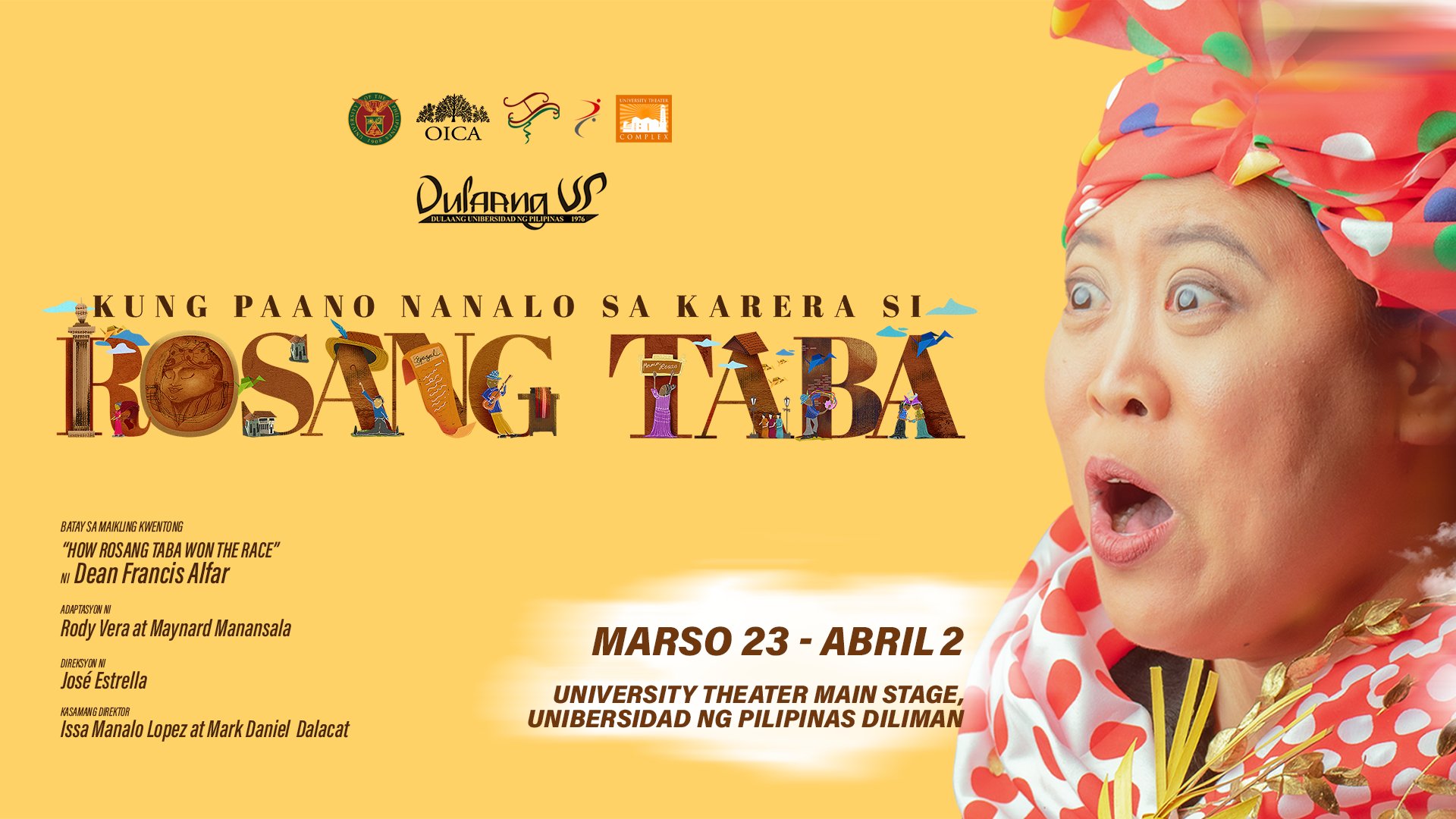
UNI REVIEW: Dulaang UP’s ‘Kung Paano Nanalo sa Karera si Rosang Taba’
Note: For transparency, the author of this TFM review was previously cast member Mari Palaganas’s high school drama club teacher.
If the first DUP pandemic production was the furiously incendiary Floy Quintos meditation on how the 2022 elections tore families apart (Reconciliation Dinner), this second offering is no longer merely a nod to its season’s theme, “balikwas” (to rise again), but a continuation of the first play’s political message, with the second meaning of “balikwas” (a reversal) manifesting in a total change of approach.
We attract more flies with honey, and there is much that delights in the good-natured humor of this play rife with the ubiquitous Tiktokerist quotations that seem to pervade the most recent Filipino productions. But underneath the sweet peals of laughter, one finds the embittered core of an oppressed people in Rody Vera’s and Maynard Manansala’s script.
A rose by another name
Vera and Manansala adapted the short story Dean Francis Alfar wrote seventeen years ago on how an overweight Filipina challenged a Spanish Adonis to a race. This has transformed into an alternative re-telling of “herstory,” combining events from three hundred years ago (as well as last year’s) into a powerful–yet humorous–reminder of what keeps us bound, of what is worth fighting for.
While the short story focused on sexual and racial politics, the play’s brand of politics becomes glaringly obvious upon first entering the venue. One escapes the hot summer air and enters a square stage-in-the-round, with what can pass for any barangay’s plaza, except it has neon pink and yellow lights advertising a friendly neighborhood restaurant: Mama Rosas.
And then it clicks.
The long title of the play (Kung Paano Nanalo sa Karera si Rosang Taba) had actually hidden the political overtones that, in hindsight, were there all along. Those of a different political persuasion should be aware that this is a reimagined story with another pink lady, in a different kind of race.
Here, there, or anywhere
Mark Daniel Dalacat’s ingenious set design (and co-direction, along with Issa Manalo Lopez) made full use of the small space by playing with scale: buildings and ships were pushed in on trolleys, time and place changes indicated by unfurling banners.
We are in Bayan ng Hinirang, or to be specific: a very thinly veiled Hispanic Philippines, with Rosa representing Prehispanic culture and traditions. When she competes against the Spaniard in the narrowest alley in Plaza Binondo, it can be read as feminism versus the patriarchy, or the colonized fighting the oppressor. Or even a class issue. The play is a metaphorical theme park.
It is not for nothing that the street where the battle of the sexes/races/classes takes place is called The Street of Lost Hope (Kalye ng Nawalang Pag-asa). Narrow and small, how can one so big of heart squeeze through?
What is at stake?
The play’s climax, of course, was the high-stakes race between Kiki Baento (Rosa) and Victor Sy (Pietrado). Barbie Tan-tiongco’s lights design effectively heightened the tension as the strobe effect seemed to slow down each momentous step forward, each painful lunge.
It is far more than a mere foot race.
“Do you even know what is at stake?” Aldo Vencilao as Rosa’s protective father asks in despair. “Opo, ang ating pagkatao.” (“Yes, our very humanity”) is the resounding reply, as Rosa embodies both her sex and her race in a struggle to be accepted as Pietrado’s equal.
Angel Dayao’s music skillfully evoked the clash of civilizations, as live guitar alternated between Western broken chords and melodic ostinati reminiscent of Kalinga gangsa music, and characters burst into song to celebrate even “mundane” gender-coded tasks like cooking in “Lutong Hinirang.” As if the pink and yellow lights design weren’t enough to drive home the point, musicians come in encouraging the audience to chant along: “Pag sinabi kong MAMA, sabihin niyo ROSAS!” making audience members participate in the co-creation of an alternate reality.
Veteran performances
We partners-in-creation can choose from two sets of casts. On the night this reviewer watched, five of the six roles were essayed by veterans while student Mari Palaganas ably took on the dual roles of the governor general’s wife and the youngest Rosa. Her long skirted imperiousness did not distract us from the fact that she wore the pants in her marriage with Jojo Cayabyab as Gobernador Heneral, whose stutter all throughout the show was a running gag.
Satire? Characterization? We aren’t sure, but what we do know is that when fellow Spaniard, Victor Sy as Pietrado, stands beside his leader, the physical appeal of the athletic Kastila was such that he almost made the evils of imperialism look good. What madman would even think of challenging such a fine specimen of manhood to a physical bout? No man, but perhaps, a woman driven by pride and love for country would.
One whose incredible charisma cannot be contained in a stick figure, Kiki Baento’s combination of charm and strength made her the literal heart of the show as the titular character. Her giant smile won our hearts, as well as her brilliant performance. We understand why her parents, portrayed by Aldo Vencilao and Peewee O’Hara, are so enamored and fiercely protective of her. The scenes where they try to convince their daughter to quit are heartbreakingly earnest.
This university play invites us to embrace largeness of heart, of ambition. To dream is to hope, and along with dream’s twin, joy, the play leaves its audience more joyful at the reminder of our people’s collective’s dream–if only for a summer evening.
For more information on this university-based production, click here.


Comments